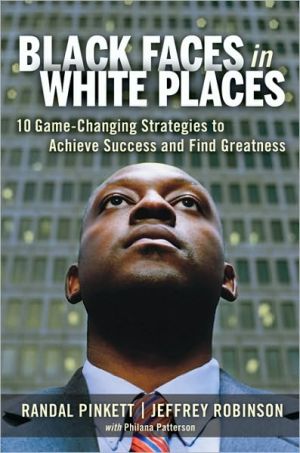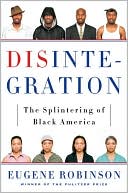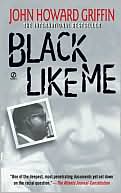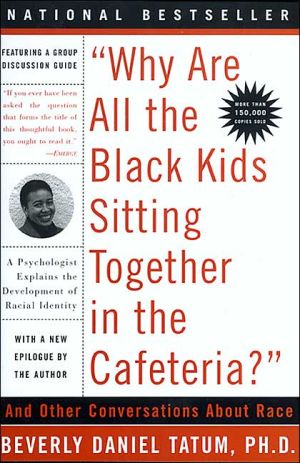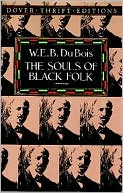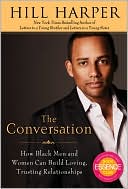Black Faces in White Places: 10 Game-Changing Strategies to Achieve Success and Find Greatness
Advance Praise for Black Faces in White Places\ “Randal Pinkett and Jeffrey Robinson’s book has much to say about solutions to our challenges in the Age of Obama. Don’t miss it!” — Cornel West, Princeton University\ “There are three types of people in this world: those who make the rules, those who follow the rules, and those who redefine the rules. Drs. Pinkett and Robinson have given us a revolutionary roadmap for people of color to accomplish the latter, and to do so in a way that benefits...
Search in google:
"As an African American, you've heard the adage that you need to work twice as hard as white counterparts to succeed. So you play "the game" and anticipate being rewarded for your talents and hard work. Now you're up for a prized promotion, landmark business deal, or other professional breakthrough---this is your moment...." "It's at this point that many African-American professionals experience a "black faces in white places" moment: a point at which it becomes all too clear that just playing well isn't enough---because the rules can change on you in a heartbeat. This scenario plays out countless times each day in American workplaces, and for Randal Pinkett it played out on national television---when Pinkett's seemingly storybook ending during the finale of The Apprentice was about to get an unexpected twist." "Black Faces in White Places is about that very game---the one played in the competitive world in which we all live and work. While exploring the ideals and realities of identity, meritocracy, opportunity, and society, the book lays out ten concrete strategies to help you become a "game changer." The ten strategies will advance you to the next level of personal and professional success and unleash the greatness that lies within you." "The book also examines social responsibility, institution building, and longstanding traditions of giving throughout African-American culture and history." Based on interviews with dozens of prominent African Americans and the authors' considerable experience in business, in the public eye, and in the minority, Black Faces in White Places shows how as an African-American professional you can (and must) think and act both entrepreneurially and "intrapreneurially"; combine the strengths of your peers with the wisdom of others; and plant the seeds of a positive and lasting legacy.Library JournalPinkett (Campus CEO) won season four of The Apprentice, the first African American winner. Here he offers ten strategies not simply for successful entrepreneurship but also successful "intrapreneurship," gaining success through knowing oneself and the realities of functioning in today's society.
Introduction\ \ I wrote these words for everyone who struggles in their youth.\ Who won’t accept deception instead of what is truth.\ It seems we lose the game, before we even start to play.\ Who made these rules? We’re so confused. Easily led astray.\ —Lauryn Hill, “Everything Is Everything”\ Not Getting Trumped: Randal’s Nationally Televised\ “Black Faces in White Places” Moment\ It had all come down to this moment: Onstage at New York’s Lincoln Center, on live television with millions of people watching the possibility of me, Randal Pinkett, being chosen as real estate mogul Donald Trump’s next Apprentice.\ It was the fourth season of the NBC hit reality show The Apprentice, and Trump would ultimately choose one person, out of eighteen candidates—selected from more than one million applicants—to work for The Trump Organization. At stake: the $250,000 prize and the opportunity to be part of a renowned company that runs—in addition to real estate—gaming, entertainment, media, and educational enterprises.\ The competition was whittled down to Rebecca Jarvis—a financial journalist who had previously worked for a short time in investment banking and trading—and me.\ I believe Trump’s choice should have been clear. Each week on The Apprentice, teams were charged with tasks under the direction of the team member selected as project manager. As project manager, I was undefeated, while Rebecca had a record of one win and two losses. When other project managers had a chance to choose team members, I was picked far more often. Rebecca was twenty-three years old at the time, and just beginning a career in business journalism. Ten years her senior, I was running BCT Partners, a multimillion-dollar consulting firm, and had already founded four other companies. Rebecca did have great education credentials, having earned an undergraduate degree from the prestigious University of Chicago. Still, my academic experience included five degrees, including an MBA and PhD from MIT, and a Rhodes Scholarship to attend Oxford University.\ But this was reality television, and things turned on the unpredictable, so I was prepared for almost anything to happen. The final show of the season was a two-hour live event. Our final tasks, the outcome, the boardroom evaluations, and the debriefing of our team members had been taped and aired. It was time for Trump’s choice.\ For those of you who missed it, or need a refresher, here’s how those final seconds went down:\ Trump said, “Randal you’re an amazing leader. Amazing. Rarely on this . . . (Applause) Rarely have I seen a leader as good as you, and you lead through niceness. I mean, you really lead through example, and I think you’d be the first to admit that, Rebecca. People follow Randal whenever there’s a choice—we want Randal—I mean it just happened four or five times. I’ve never seen anything quite like it.”\ Then he declared, “Rebecca, you’re outstanding. Randal, you’re hired.”\ I leaped out of my chair, did a bit of an end-zone-esque celebratory move, and was embraced by several of the previously “fired” Apprentice candidates. My family and friends in the Lincoln Center audience and a group at a party in Newark, New Jersey, cheered my victory.\ Then, the “moment.”\ My celebration was stopped short when Trump’s voice called over the applause and well-wishes.\ “Randal. Randal. Randal. Randal. Randal,” Trump said. “Sit down for a second. I want to ask your opinion.”\ I took a seat at the “boardroom” table next to Rebecca.\ Trump continued: “You two were so good, I have to ask your opinion. What do you think of Rebecca? If you were me, would you hire Rebecca also?”\ I thought, Is he serious? Apparently he was, and I was insulted and angered. No previous winner had ever been asked that question before. That marked my nationally televised “Black Faces in White Places” moment.\ —Randal Pinkett\ w w w\ Your “moment” may not have been viewed on-air by millions of people, but if you’re Black, it’s likely you’ve had one. Perhaps you are the only Black in your predominantly white high school and have been asked to speak to the student body, as if you represent the entire Black community. Perhaps you serve as the founder and CEO of a Black-owned business that constantly has to prove and re-prove itself to the marketplace while larger firms are allowed to fail without any repercussions. Perhaps you work for a corporation with little to no minority representation and, for some reason, your opinion seems to fall on deaf ears, while the opinions of your colleagues somehow always carry weight. Perhaps you are one of the few, if not the only person of color in your department, division, or even company, and feel the weight of your race with regard to basic performance. You’re worried that if you’re late, all Black people are considered tardy. If you fail, all Black people are considered failures. But if you succeed, you’re the exception!\ The range of such moments is as varied as we are as a people. While the larger society often views Blacks as a monolithic group, we know better. We are liberals and conservatives. We are rich, poor, working, and middle class. We are laborers, blue-collar and white-collar workers. We are Protestants, Catholics, Muslims, Buddhists, atheists, and agnostics. Though small in number, there are even Black Jews. Some of us have dropped out of school and some of us have earned multiple degrees. We are diverse—but at the beginning of the day, in the middle of the day, and at the end of the day, we are Black. And at some point—whether it’s early in life or late, we all will have our “moment” when we are confronted with a challenge related to our race.\ Coach C. Vivian Stringer and the women of the Rutgers University women’s basketball team had their moment when radio personality Don Imus decided to refer to them as “nappy-headed hos” the morning after they played in the championship game of the NCAA Tournament. But they spoke back with dignity and held their heads high as they graced the cover of Newsweek magazine and received the Wilma Rudolph Courage Award from the Women’s Sports Foundation—awarded to female athletes who exhibit extraordinary courage and surmount adversity. Coach Stringer and her team “redefined the game.”\ Olympic speed skater Shani Davis had a moment when he was unfairly criticized by a white skater (who had previously lost a race to Davis) for not being a “team player” when he chose to participate in an individual competition over the team event: an educated decision that was actually as much (if not more) for the benefit of the team than for himself, since Davis had never practiced or participated in the team event. But rather than submit, Davis stood by his decision and redefined the game when he became the first Black athlete to win a gold medal in an individual sport at the Winter Olympics.\ Cathy Hughes had her moment when she realized the inherent limitations of remaining at a white-owned radio station, WYCB. Though she had faced thirty-two rejections before a bank granted her husband and her a loan, she persevered and redefined the game by creating Radio One, the largest radio broadcasting company targeting African American and urban listeners.\ And perhaps the most stunning “Black Faces in White Places” moment of our time: Barack Obama making the bold decision to run for the presidency of the United States when many, including prominent Civil Rights leaders, said America wasn’t ready. But not only did he win the Democratic nomination, he redefined the game by becoming the first African-American president of the United States in the face of millions of naysayers—a Black man in the White House.\ What all these people have in common is that they learned the game, played the game, mastered the game, and, at that “Black Faces in White Places” moment, found themselves in a position to redefine the game.\ So how did Randal perform in his moment? Read on . . .\ w w w\ Randal: Mr. Trump, Mr. Trump, Mr. Trump. I firmly believe that this is The Apprentice—that there is one and only one Apprentice, and if you’re going to hire someone tonight it should be one.\ Trump: Okay.\ Randal: It’s not “The Apprenti”!\ Trump: Okay.\ Randal: It’s “The Apprentice.”\ Trump: All right, I’m going to leave it at that, then. I think I could have been convinced, but if you feel that’s the way it should be.\ Randal: I think that’s the way it should be.\ Trump: I’m going to leave it that way, then. Congratulations.\ Randal earned the right to be named the soleApprentice and refused to be one of two apprentices. (The plural form is, of course, “apprentices,” not “apprenti”—but, hey, it made for a great one-liner!) He asserted himself and did not allow the rules of the game to change at the last minute. In front of millions of Americans, in his own modest way, he redefined the game. And Trump never asked that question of any winner on The Apprentice again.\ But you don’t have to be a college basketball player, a world-class Olympic athlete, a radio titan, a presidential candidate, or a reality TV star to have such a moment. Many others have overcome their moments, too. This book is designed to help you transcend your own “Black Faces in White Places” moments, redefine the game, and make it easier for the next generation to do the same.
ForewordAcknowledgmentsIntroduction 1Not Getting Trumped: Randal's Nationally Televised "Black Faces in White Places" Moment 1The Four Dimensions of Black Faces in White Places 9A Roadmap for Redefining the Game and Reshaping America 14The 10 Game-Changing Strategies to Achieve Success and Find Greatness 16PART I LEARNING THE GAME 21America's Story: The United States and Race 21Learning What the Game Is All About 23Strategy 1 Establish a Strong Identity and Purpose 28Identity 29Purpose 35Identity and Purpose for African Americans 37Self-Determination: Your Identity as an Asset and Your Purpose as a Source of Power 45The Interdependence of Strategies 1 and 2 47Strategy 2 Obtain Broad Exposure 48Your Comfort Zone and Growth Zone 50Why Moving Beyond Your Comfort Zone Is Important 51Pursuing Broad Exposure and Diverse Experiences 54Looking Back, Looking Ahead 56Strategy 3 Demonstrate Excellence 58One Playing Field, Two Sets of Rules 60Defining Excellence 62Why You Must Be Excellent 79Game-Changing Strategies for Demonstrating Excellence 80From Independence to Interdependence 86PART II PLAYING THE GAME 87Three Trends in a More Interconnected World 87Relationship Building: The Power of Connectedness 89Playing the Game: Relationships, Relationships, Relationships 91Strategy 4 Build Diverse and Solid Relationships 92Personal Diversity 93Relationship Building 96Three Compelling Ideas about Relationships 98The Strength of Weak Ties 99Bridging Network Gaps 102Game-Changing Strategies for Networking and Relationship Building 107Strategy 5 Seek the Wisdom of Others 110What Is Wisdom? 110The Five Tenets of Seeking Wisdom 112Developmental Relationships 114Mentors and Proteges 117Game-Changing Strategies for Mentors and Proteges 121Strategy 6 Find Strength in Numbers 126The Power of Strength in Numbers: Don Imus Gets Taken Down 126Group Relationships 131Strength in Smaller Numbers: Inner Circles, Teams, and Partnerships 134Strength in Smaller Numbers Leads to Strength in Larger Numbers 143Strength in Larger Numbers: Organizations 144Game-Changing Strategies for Organizational Involvement 150Strength in Numbers Sets the Stage 155PART III MASTERING THE GAME 157The Entrepreneurial Mindset 157Intrapreneurship and Entrepreneurship 158Five Ways to Master the Game 161A Two-Pronged Approach for Redefining the Game 163Strategy 7 Think and Act Intrapreneurially 165African-American Intrapreneurship 166Game-Changing Strategies for Intrapreneurship 168Social Intrapreneurship and Community Investment as a Competitive Advantage 178The Cycle Continues 182Strategy 8 Think and Act Entrepreneurially 183African-American Wealth Creation 185Applying the Entrepreneurial Mindset 191Game-Changing Strategies for Entrepreneurship for a Profit 194Social Entrepreneurship 200Game-Changing Strategies for Entrepreneurship for a Purpose 203Institution Building 210PART IV REDEFINING THE GAME 213Prerequisites to Redefining the Game 213What We Mean by "Redefining the Game" 215Changing the Game vs. Redefining the Game 216Strategy 9 Synergize and Reach Scale 219Creating Synergy 219Reaching Scale and Expanding Scope 222Profiles of Synergy, Scale, and Scope 224The Critical Importance of Synergy and Scale to African Americans 228Strategy 10 Give Back Generously 233Leaving a Positive Legacy 234America's Shape and Reshaping America 239The African-American Tradition of Giving 240The Four Foundations of Giving 244Strategy 10 to Strategy 1: Identity and Purpose Revisited 249Final Quotations and Final Questions on Giving Back 251What Does Redefining the Game and Reshaping America Mean to You? 251Epilogue: Is Success the Standard or Is Greatness the Goal? 253Success vs. Greatness 254Notes 259Index 261About the Authors 267
\ From the Publisher“…important and groundbreaking book…provides the tools necessary for African Americans and members of other minorities, to achieve success and respect on their own terms.” —BlogBusinessWorld\ “…Pinkett and Rutgers Business School Professor Jeffrey Robinson present a trailblazing path for leveraging ethnic and cultural assets to not only win the game of success in any arena, but to reshape America and leave a powerful legacy for generations to come…. They show how to achieve professional and personal success while affirming and amplifying racial pride by learning, mastering, and ultimately redefining ‘the ever-changing game’ - their new metaphor for our competitive world of work and life. Building on the four dimensions of the contemporary Black experience - identity, society, meritocracy, and opportunity their book provides a strategic roadmap to keep African Americans moving forward in their journey toward not simply equal treatment but equal respect for their diversity and uniqueness. Covering ten groundbreaking strategies, they inspire and empower every Black man and woman.” -- Career News Service\ “…a trailblazing path for leveraging ethnic and cultural assets….[the authors] inspire and empower every Black man and woman.” -- Career News Service\ “A helpful handbook designed for the average African-American armed with credentials yet in a quandary about how to flourish in the midst of a corporate culture tainted by intolerance in terms of skin color.” -- Caribbean Life\ “Black Faces in White Places is the perfect book for any Black job hunter who seeks a real career….[a] thoughtful, helpful book.” – The Chicago Crusader\ \ \ \ \ \ Library JournalPinkett (Campus CEO) won season four of The Apprentice, the first African American winner. Here he offers ten strategies not simply for successful entrepreneurship but also successful "intrapreneurship," gaining success through knowing oneself and the realities of functioning in today's society.\ \
